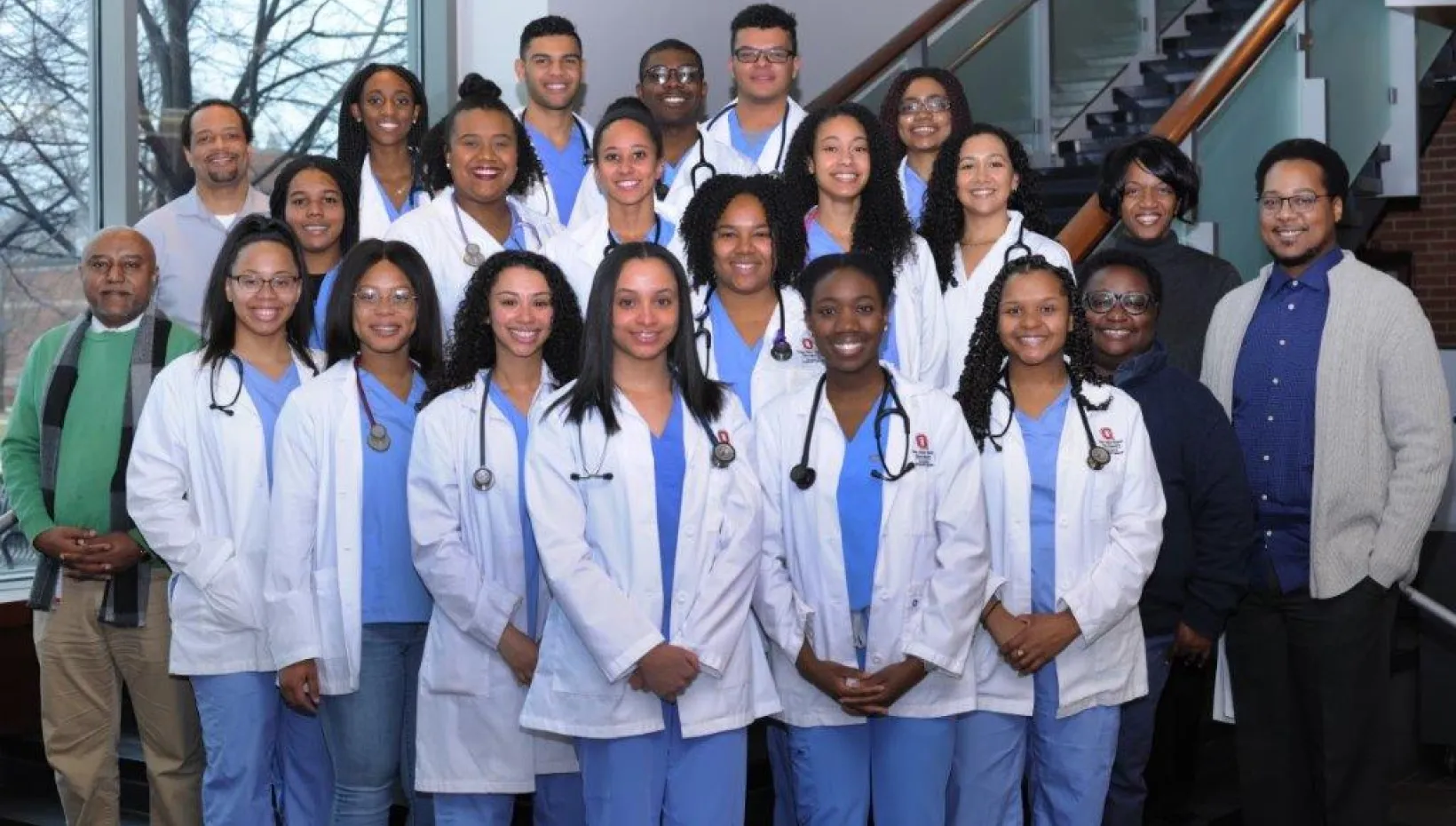Commitment to diversity, equity and inclusion championed by various groups college-wide

Article by: Allison Burk
Originally Published
At The Ohio State University College of Veterinary Medicine, we know that diversity promotes a culture of inclusion that understands and appreciates the world beyond our own individual perspective. Our goal is to foster an environment for working, learning and serving where each member of our college and those we serve feel welcome, comfortable, safe, respected, valued and can thrive both professionally and personally. The college has been consistently recognized for our efforts in these areas, most recently receiving the 2020 Health Professions Higher Education Excellence in Diversity (HEED) Award for the fourth consecutive year.
The veterinary profession is one of the most homogenous professions. We believe that until it reflects the communities we serve, there will be a barrier to providing exceptional service and care. Based on substantial research evidence, we know that the more diverse an organization or team is, the higher performing and more productive they are. Diversity enriches the learning environment and produces better solutions to complex problems.
The college established a Diversity Council in 2017 comprised of members that provide guidance and perspective to the dean regarding the college’s commitment to promote and foster an environment of diversity, equity and inclusion. The Diversity Council provides assessment, feedback, and best practices to complement the mission of the college’s Diversity, Equity, and Inclusion Committee.
The College of Veterinary Medicine’s Diversity, Equity, and Inclusion Committee develops strategies and actionable items to foster a community of inclusion within the college. The committee’s membership is comprised of faculty, staff and students and provides recommendations to the dean and college leadership.
“Diversity and Inclusion is a foundational principle of our Be The Model® strategic plan, and it’s incorporated throughout every goal area. I am incredibly proud of everyone who has contributed to these efforts to promote diversity, equity, and inclusive excellence in our college, benefiting the veterinary profession and society,” said Rustin Moore, DVM, Ph.D., DACVS, dean, College of Veterinary Medicine.
Providing a place of belonging and opportunity through the establishment of affinity groups
The Diversity Committee established Community of Inclusion Affinity Groups as sites of community engagement and formation that support an inclusive community in the college. The majority of the Affinity Groups are student-led with faculty advisors. Groups that have built consistent participation and activities include the Dr. J.H. Bias Black, LatinX, Parenting, First-Generation College Students and Women’s Veterinary Leadership Development Initiative (WVLDI) Affinity Groups. We have two newly formed Affinity groups, Asians in Vet Med and the Student Chapter of Pride VMC (LGBT+ Affinity Group).
These groups focus on areas that impact the college, such as events, training, statements, recruitment, admissions, classroom issues, creating connections, and mentorship. They also concentrate on areas that impact the veterinary profession as a whole, such as national diversity, diversity statements, and professional development ideas, and are involved with the Student American Veterinary Medical Association (SAVMA). Another strong focus of these groups is areas of community impact such as serving underserved populations, social justice issues, peaceful protests, and providing exposure to the profession to underrepresented K-12 and undergraduate students.
The Community of Inclusion Certificate Program for the College of Veterinary Medicine was developed by the Diversity, Equity, and Inclusion Committee as a way for members of the college to demonstrate their commitment to fostering diversity, equity, and inclusion within the college, the veterinary profession and the communities served. The goal is for members of the college to have increased knowledge of various cultures and backgrounds as measured by the completion of different ‘experiences’ that count towards the certification. One example the college and the Community of Inclusion Program are taking to help our people become allies or better allies is the initiation of monthly sessions titled Breaking Barriers and Fostering Inclusion: Steps We Can Take Towards Becoming Allies.
“It is the hope that these experiences will provide the tools to enhance cross-cultural communication in the college and with our clients and community partners, foster a climate of inclusion, support those who wish to further diversity, equity, and inclusion in the profession, and to serve as a mechanism to acknowledge individual efforts in these areas formally,” said Mary Jo Burkhard, DVM, PhD, DAVCP, associate professor and associate dean, Faculty & Staff Affairs, Inclusive Diversity, and Planning.
College of Veterinary Medicine recognized for its efforts
As a result of the ongoing work and dedication towards these efforts, for the fourth year in a row, The Ohio State University College of Veterinary Medicine is a recipient of the 2020 Health Professions Higher Education Excellence in Diversity (HEED) Award — a national honor recognizing U.S. colleges and universities that demonstrate an outstanding commitment to diversity and inclusion.
The college was selected for this award because of our ongoing work to foster a culture of diversity and inclusion with specific recognition of three highlighted areas:
• Focusing on recruiting underrepresented minorities and first-generation students by reducing barriers to entering the profession, providing engaging learning opportunities, and creating an academic community that fosters inclusion.
• BE WELL programming that teaches a foundation of health and well-being skills before students enter their professional careers.
• Outreach and engagement opportunities such as the Pet Owner and Pet Care Program and the Veterinary Medicine Outreach Program provide care to underserved populations and unique service-learning experiences for students.
“The College of Veterinary Medicine is especially honored to be selected annually since 2017. While we know we have much more to do to become the model working and learning environment that supports inclusive diversity in all we do, we are honored by this recognition of our efforts to date,” said Rustin Moore, DVM, PhD, DACVS, dean, College of Veterinary Medicine. “It is my duty to nurture an environment where all people, regardless of their attributes, backgrounds or perspectives, feel welcome, comfortable, safe, respected, valued and can be successful, satisfied and thrive in their working, teaching, learning and serving environments.”